Dehydrating food at home is a valuable skill to have for several reasons. Dehydrated food can last for months or even years if stored properly, making it a great option for stocking up on seasonal produce or for creating your own emergency food supply. In this blog post, we will guide you through the process of dehydrating imitation crab meat, a versatile ingredient that can be enjoyed by hikers, campers, and preppers alike.
Imitation crab meat, often found in sushi and pre-packaged seafood salads, is made with real fish meat, usually from surimi or white fish flesh. It offers a nice flavor, pairs well with other ingredients, and dehydrates easily. Moreover, it reconstitutes quickly, making it an excellent choice for outdoor cooking with limited time and resources.
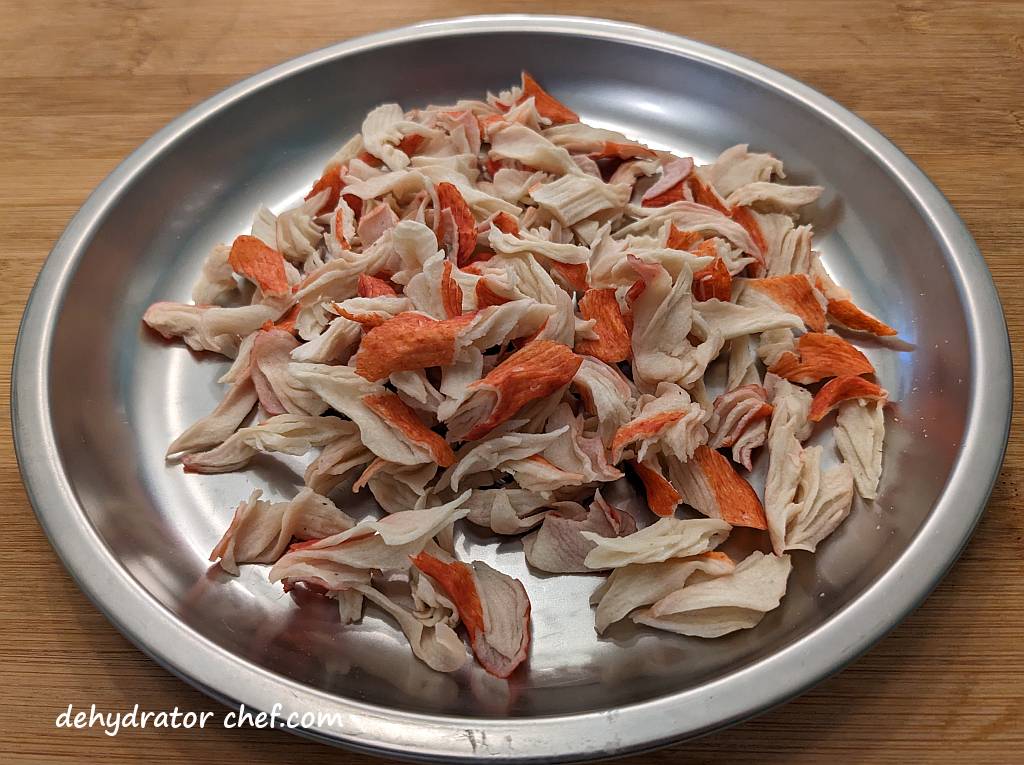
So, grab your dehydrator, and let’s get started!
Table of Contents
- How to Dehydrate Imitation Crab
- Supplies Needed for Dehydrating Imitation Crab Meat
- Step 1. Process the Imitation Crab Meat for Dehydrating
- Step 2. Preparing the Dehydrator for Dehydrating Imitation Crab Meat
- Step 3. Dehydrating Imitation Crab Meat
- Step 4. When is the Dehydrated Imitation Crab Meat Done
- Step 5. Equalizing and Conditioning of the Dehydrated Imitation Crab Meat
- Step 6. Storing Dehydrated Imitation Crab Meat
- How to Rehydrate Dried Imitation Crab Meat
- Weights, Measures, and Serving Sizes
- Dehydrated Imitation Crab Meat Nutrition Information
- Insider Tips
How to Dehydrate Imitation Crab
Dehydrating food at home is a useful skill to have for several reasons. Dehydrated food can last for months or even years if stored properly, making it a great option for stocking up on seasonal produce or for creating your own emergency food supply.
For today’s dehydration project, we are using imitation crab meat. Just what is imitation crab meat? Whether or not you realize it, you’ve probably eaten imitation crab before. It’s quite common in sushi that you might pick up at the grocery store and pre-packaged seafood salads.
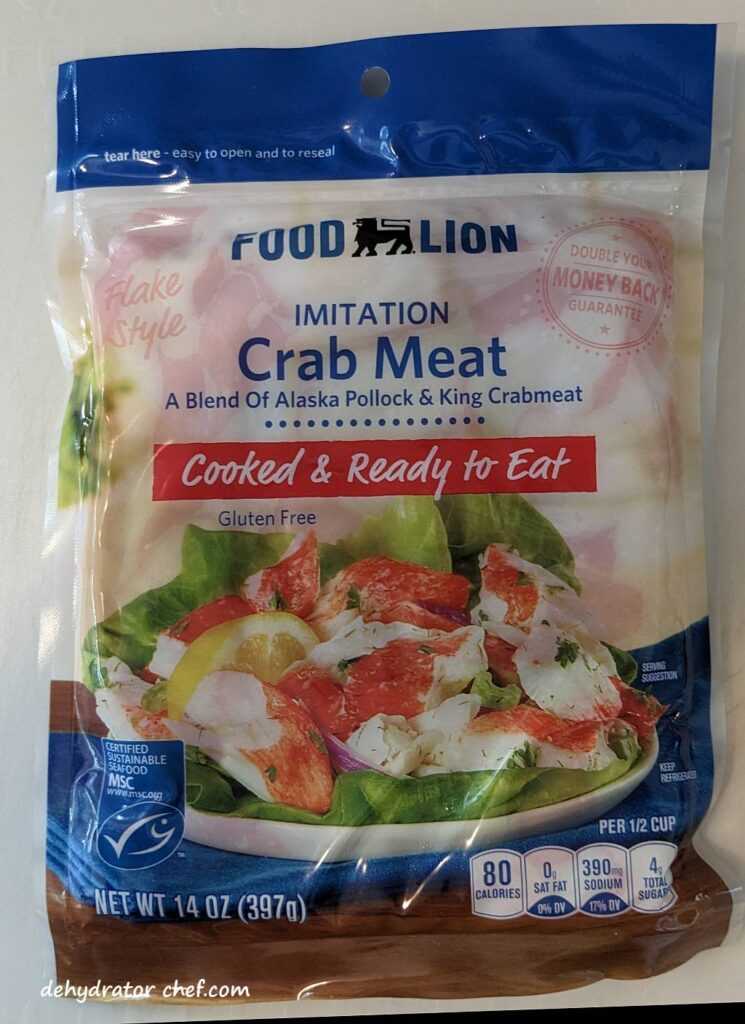
Imitation crab is actually made with real fish meat, generally not crab meat though, but check the ingredients. It’s usually made from surimi, or white fish flesh, like Alaskan Pollock, that has been deboned and minced into a paste, which is then mixed with other ingredients.
Dehydrated imitation crab will last up to 4 or 5 months, if not longer, when properly dehydrated, conditioned, and stored under ideal pantry conditions.
All you need to dehydrate these foods is a good quality food dehydrator. We use the Nesco food dehydrators. You can check out our food dehydrator guide to learn why we think Nesco offers the best bang for the buck. We believe this is the best food dehydrator for our long-term food storage needs.
Supplies Needed for Dehydrating Imitation Crab Meat
- Several packages of imitation crab meat
- Food dehydrator
- Removable mesh screen inserts, one for each dehydrator tray
- Common kitchen tools such as cutting boards, chef’s knife, etc.
- Canning jars with tight-fitting lids
- Wide-mouth canning jar funnel
- Food-safe desiccant packets
For planning purposes, we used 3 dehydrator trays lined with removable mesh screen inserts for the 14-ounce package of imitation crab meat.
Step 1. Process the Imitation Crab Meat for Dehydrating
We start by opening the package and working in batches, tear the contents into small pieces. Imitation crab meat flakes just like real fish. So use that to your advantage while breaking it down into smaller and thinner pieces.
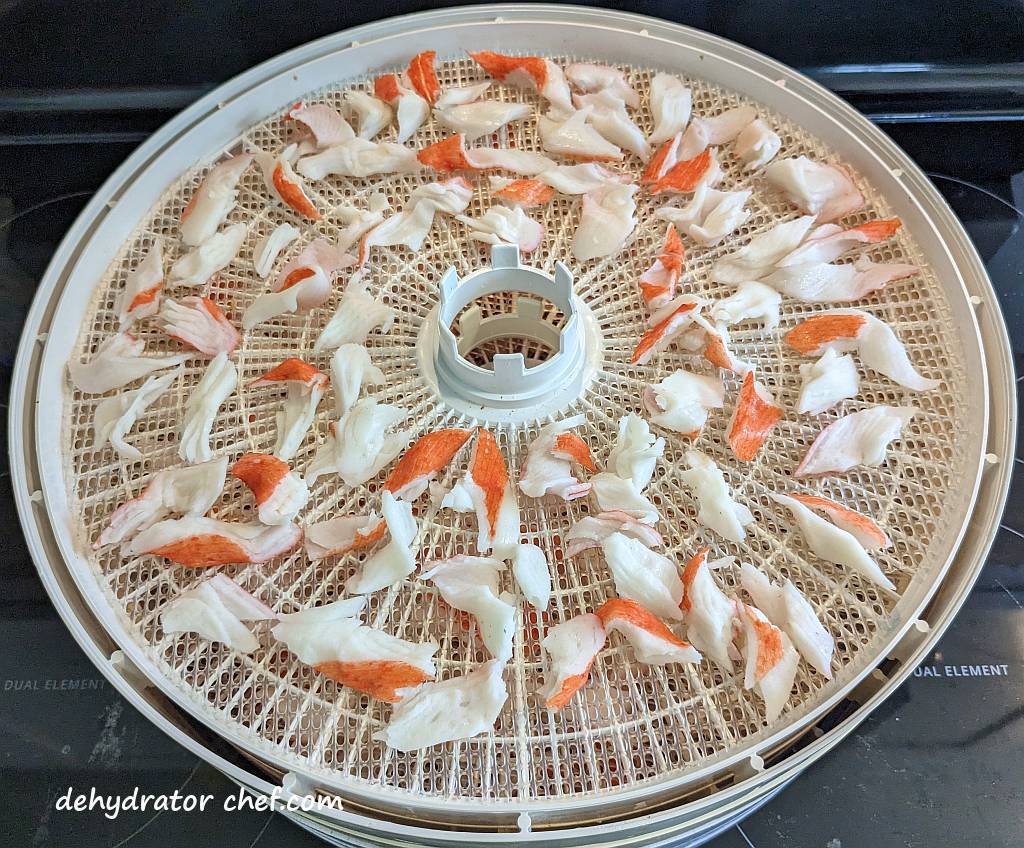
That’s it. Easy enough.
Step 2. Preparing the Dehydrator for Dehydrating Imitation Crab Meat
In a single layer, spread out the imitation crab onto the removable mesh screen inserts. Try to spread the pieces out in a single layer for faster drying times.
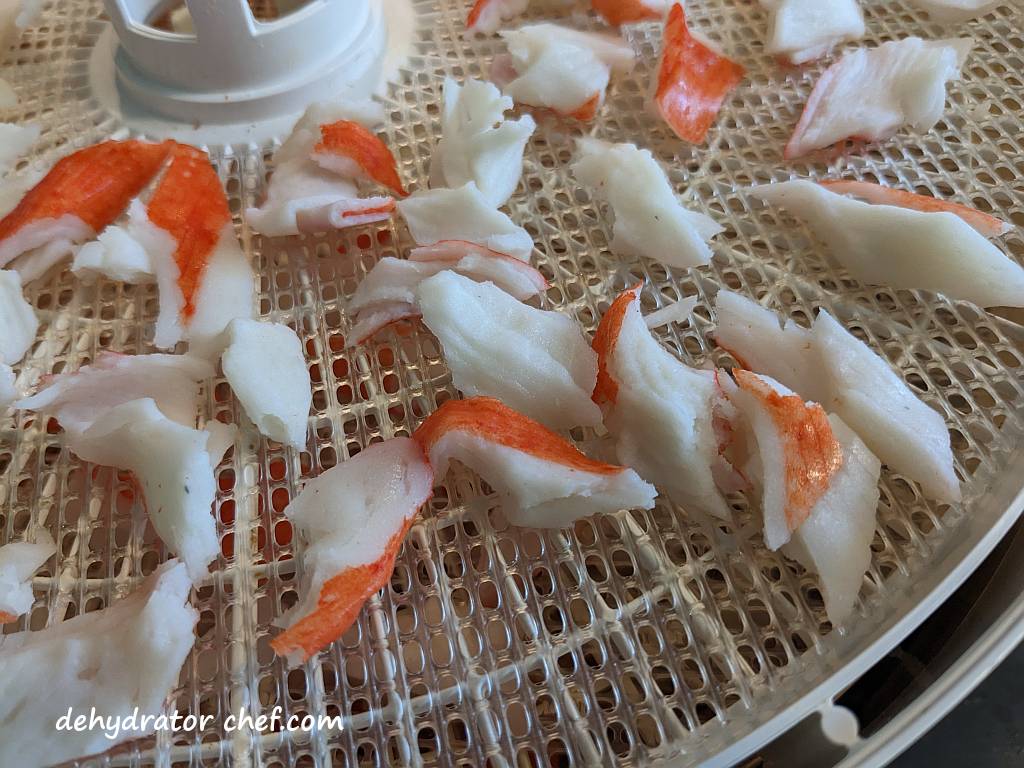
For best results, don’t overcrowd the dehydrator trays. Leave some space between the imitation crab pieces to allow for airflow and drying.
Nesco Clean-A-Screens are removable and flexible mesh screens that have both a distinct top and a bottom side. If you had a high-powered microscope, you would see the individual strands in mesh screens have a triangle shape. The bottom side of the screen feels smooth. The top side has the point of the triangle and feels rough as you rub your fingers across the mesh.
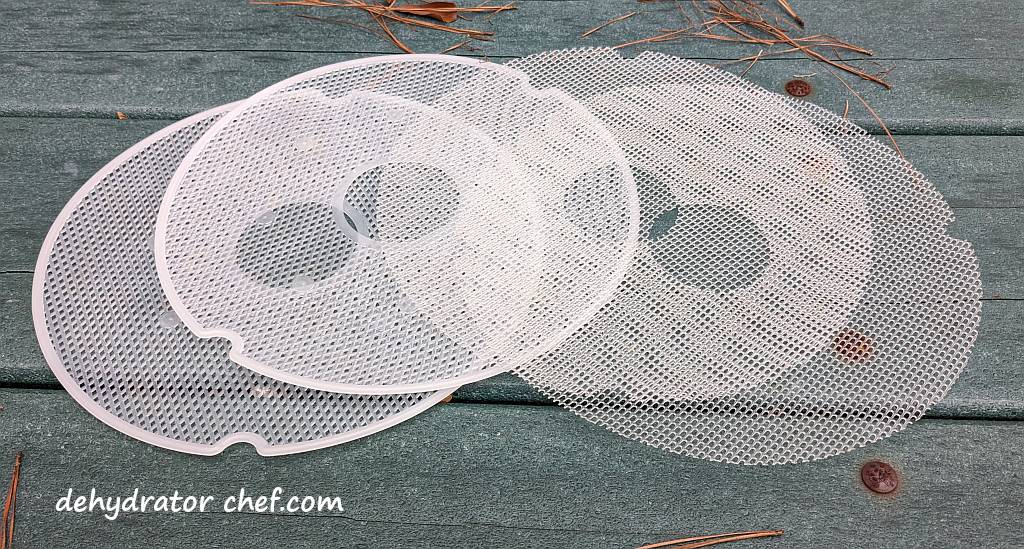
For today’s dehydrator project, we are using the Nesco Clean-A-Screen removable mesh screen inserts for sticky fruits and small food items that we are dehydrating today. They have over 2500 customer reviews with an average rating of 4.7 stars out of 5, which is evidence of a great product. Check out other Nesco food dehydrator products here.
Step 3. Dehydrating Imitation Crab Meat
For dehydrating the imitation crab meat, set the dehydrator thermostat temperature to 160 °F (71 °C). I find that 10 to 12 hours is about the right amount of time.
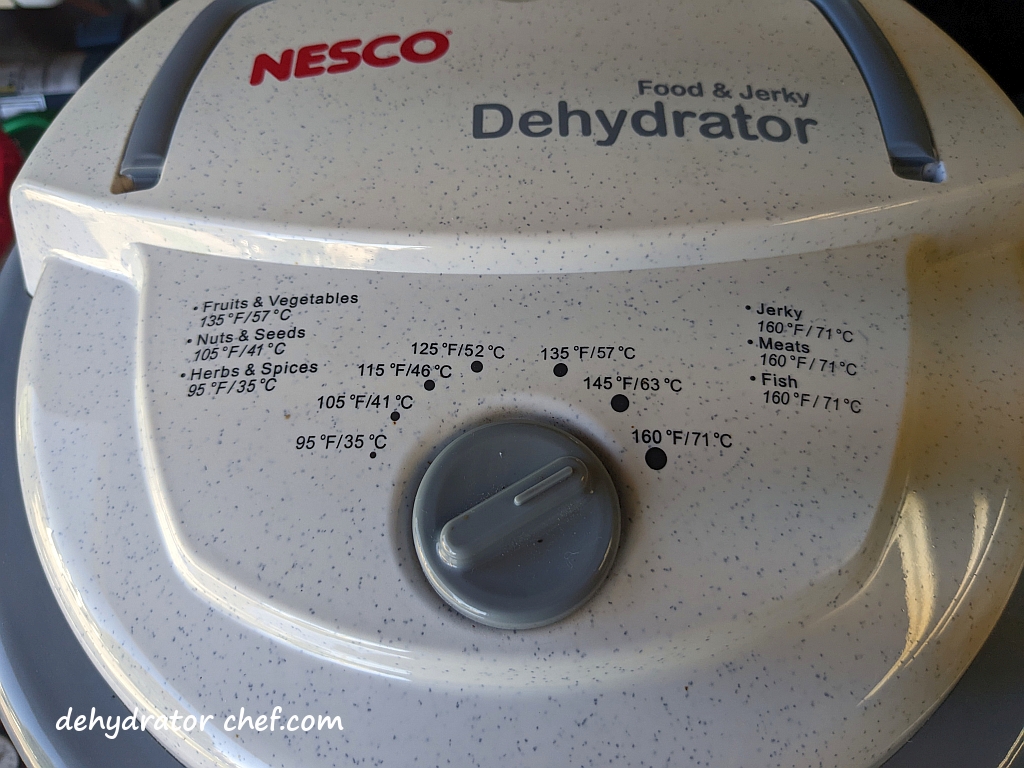
There might be a bit of a fishy smell. So you might want to dry this in the garage or outdoors, otherwise, open the windows and get a fan going.
Of course, drying times are dependent on the ambient temperature and humidity and how crowded you fill your trays. Remember to use drying times as a guide.
Step 4. When is the Dehydrated Imitation Crab Meat Done
After 10 to 12 hours, the imitation crab should be fully dehydrated. If not, let it go another 2 or 4 hours and check again.
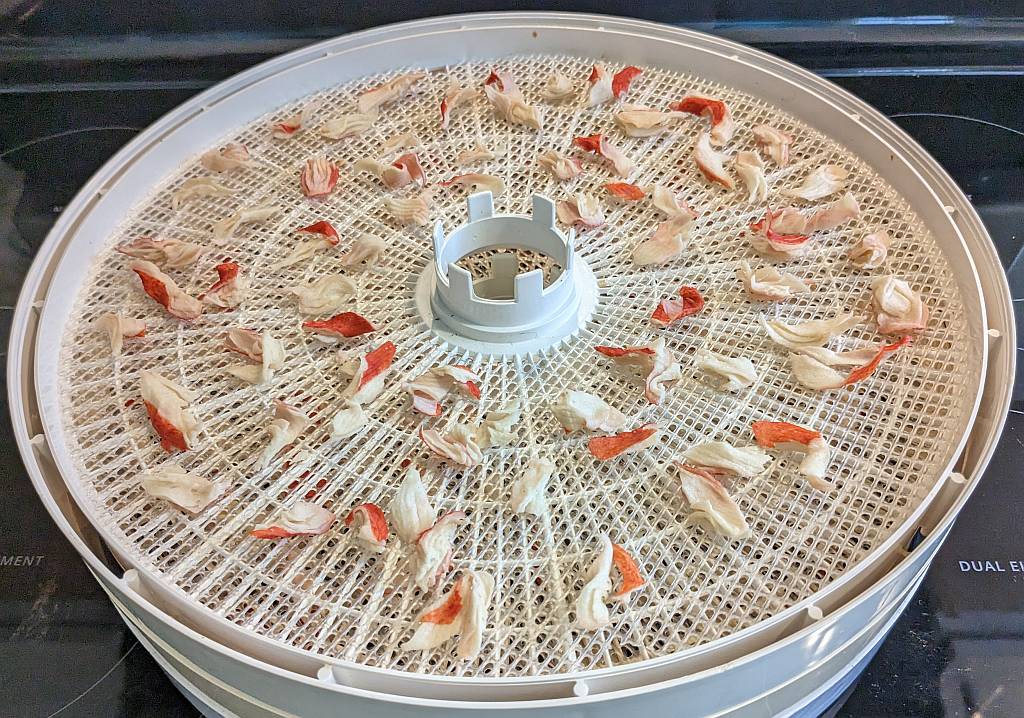
Drying times will vary depending on your dehydrator. Refer to your dehydrator owner’s manual for recommended temperatures and times for dehydrating specific foods. Remember to use drying times as a guide.
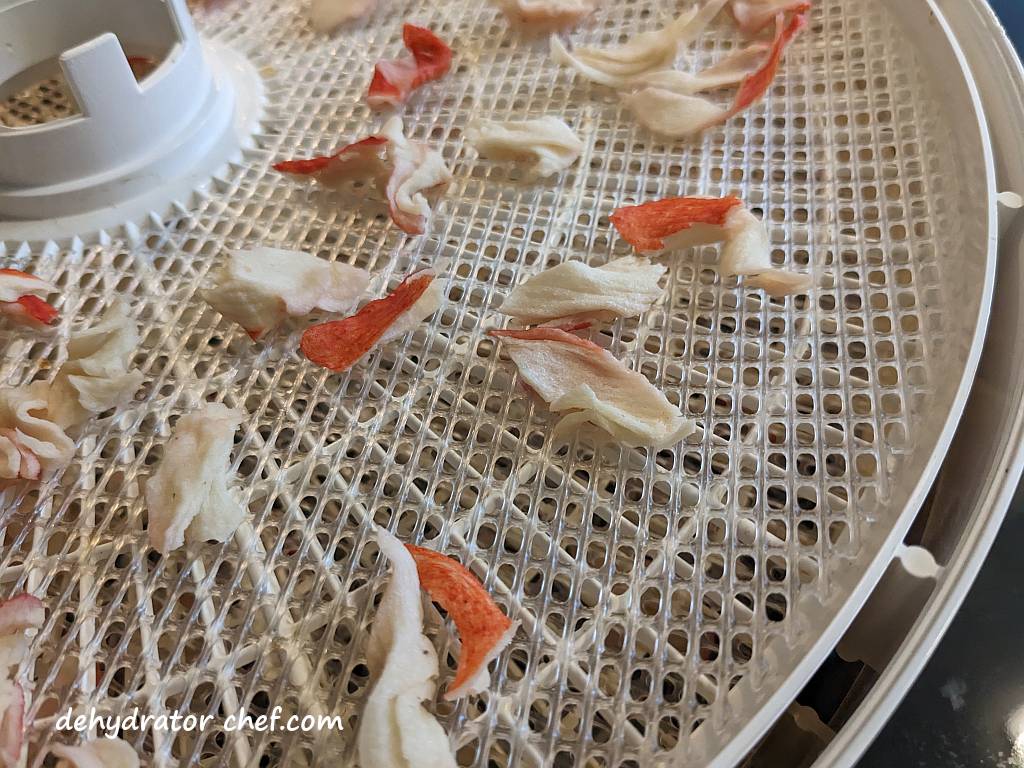
Warm imitation crab still in the food dehydrator may feel somewhat pliable, and you may believe it needs more drying time. Simply unplug the dehydrator and let everything cool down. Then check again to be sure.
The dehydrated imitation crab should feel dry when finished; it is brittle and easily snaps and breaks into smaller pieces when done.
Step 5. Equalizing and Conditioning of the Dehydrated Imitation Crab Meat
When the dehydrated imitation crab is removed from the dehydrator, the remaining moisture may not be distributed equally among all of the pieces because of their location and position in the dehydrator. Equalizing and conditioning is a process for freshly dehydrated foods that ensures any residual moisture remaining in any piece is spread or equalized among all the other pieces in the batch. Let the dried imitation crab equalize and condition in the storage container for 7 to 10 days.
We always recommend letting food items cool completely after they have finished dehydrating and before packing them into an airtight storage container for equalizing and conditioning. Warm food may cause sweating which could provide just enough moisture for mold to grow.
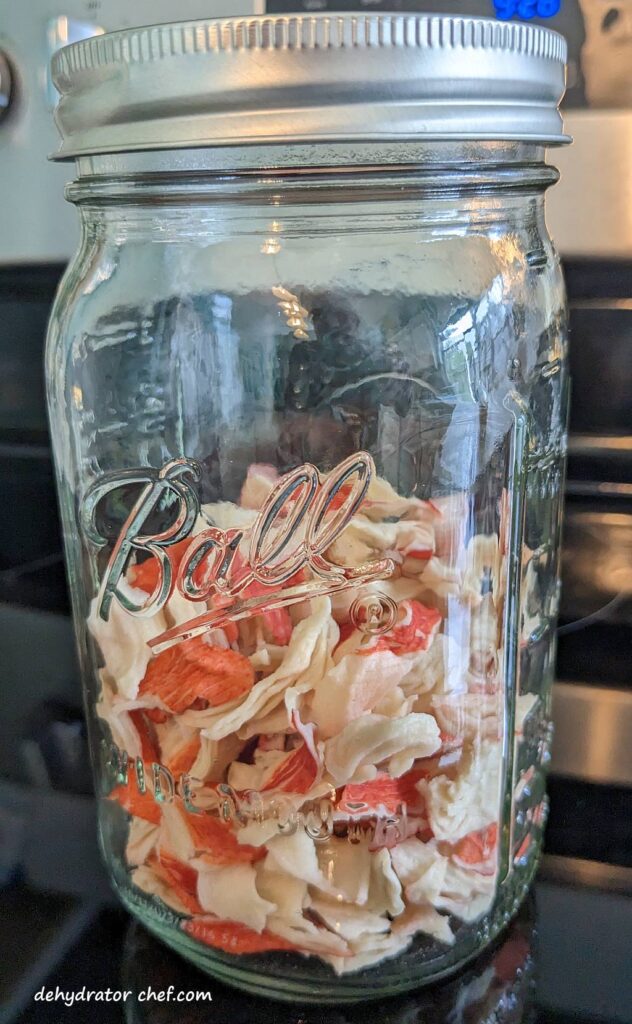
After a short cooling period, loosely pack the dehydrated imitation crab into a clean, dry, insect-proof, and air-tight storage container. We use quart-size canning jars for conditioning. Since the canning jars are clear, it’s easy to see what’s inside. Just don’t fill the jar to the top; leave some headspace.
Headspace is the distance between the food surface and the lid’s underside. Its purpose is to provide ample space for the dehydrated food product to slide and tumble when shaken and rotated to expose any evidence of clumping or sticking.
A quality stainless steel or plastic canning jar funnel makes the messy job of getting dehydrated foods off the dehydrator tray removable inserts and into the canning jars an easy task. Take a minute or two and check them out on Amazon.
Every day, check the jar for moisture. Roll the jar contents around and note any clumping or sticking. If seen, put the contents back on the dehydrator for several more hours. Since canning jars are clear, it’s easy to see what’s inside.
If you notice any mold at all, even the smallest bit, throw it all out. What you see are the mold spores finally blooming enough to make them visible. But there are more, even tinier mold spores in the rest of your jar that make your dehydrated food inedible. Toss it out, clean your gear, and start another batch.
Step 6. Storing Dehydrated Imitation Crab Meat
Dehydrated imitation crab meat will last up to 4 or 5 months, if not longer, when properly dehydrated, conditioned, and stored under ideal pantry conditions.
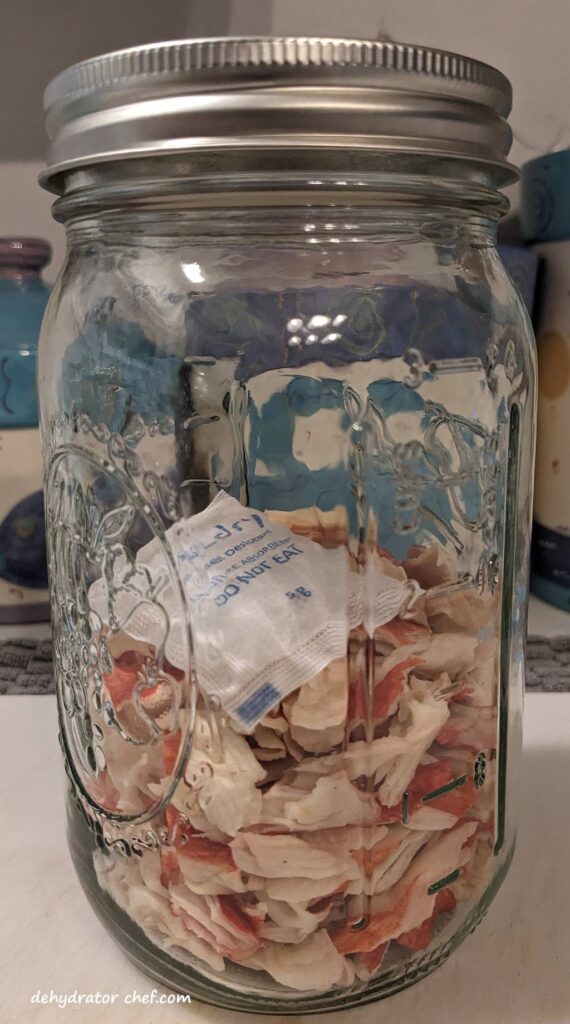
We’ll use a food-safe desiccant packet for moisture control because we live in a fairly humid area. For our pint-size or quart-size mason jars, we’ll use a single food-safe 5-gram desiccant packet. The desiccant packets will absorb any moisture and extend the shelf life of the dehydrated imitation crab meat.
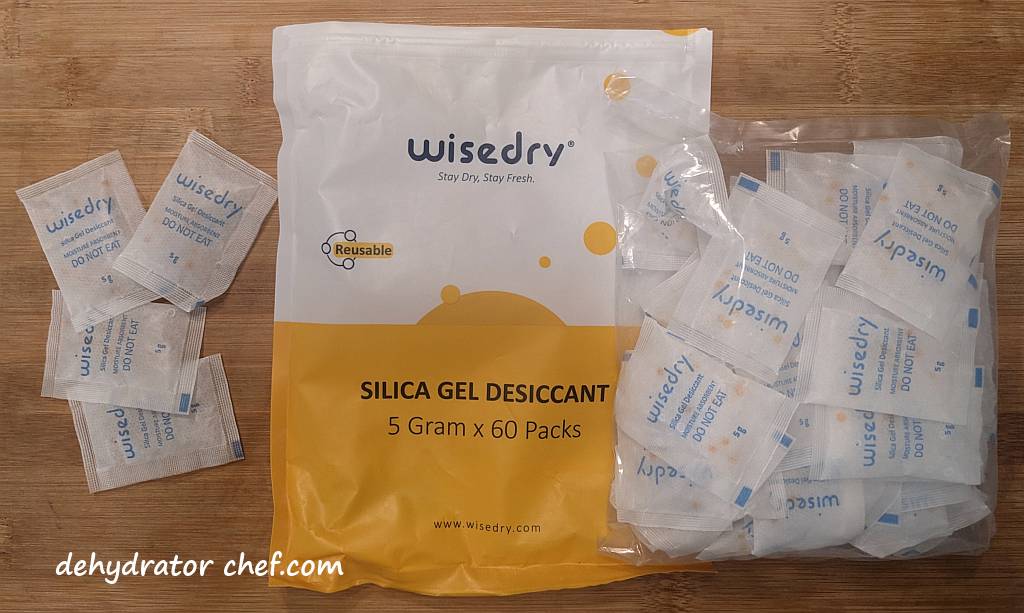
We use these inexpensive food-safe desiccant packets, which are available from Amazon. These 5-gram packets have over 5000 of mostly 4- and 5-star customer reviews, with an average of 4.7 stars out of 5. Our bag of 60 desiccant packets will last quite a while because they can be recharged and reused multiple times. Other food-safe sizes are available.
We will continue to use clear canning jars with tight-fitting lids as storage containers. They are transparent, making it easy to see the contents. We’re also adding moisture-absorbing desiccant packets in Step 6. I don’t use a desiccant packet for moisture control during the equalizing and conditioning phase in Step 5. Doing so might mask moisture issues should the food items not be adequately dried.
Lastly, attach or include a short note describing the jar contents and the date the product was dehydrated. The label identifies the canning jar contents, and the date helps with the rotation schedule. A first-in, first-out rotation helps us to use items that have been on the shelf the longest, so we’re using the oldest food first. This method helps us maintain the integrity of dehydrated products. The note also lets me know where to go in my dehydrator logbook if I want to make an update.
How to Rehydrate Dried Imitation Crab Meat
Hydrate the dried crab meat using roughly a 1-to-1 ratio of dehydrated product to boiled water, enough to fully submerge it. Plan on at least 15 to 20 minutes to fully hydrate.
If you’re supplementing store-bought freeze-dried meals as we often do, just add a bit more boiling water to the food pouch. Use the same 1-to-1 ratio of dehydrated product to water and account for the extra time. Most store-bought freeze-dried meals could use a little extra to bump up the calorie count or add more content or nutrition.
Weights, Measures, and Serving Sizes
Summarizing notes from our dehydrator logbook, a 14-ounce package of imitation crab meat, about 4 1/2 servings, will dehydrate to approximately 110 grams, which is about 24 grams per serving.
Dehydrated Imitation Crab Meat Nutrition Information
Serving Size: 24 grams | Calories: 80kcal | Total Fat: 0g | Saturated Fat: 0g | Cholesterol: 5mg | Sodium: 390mg | Carbohydrate: 14g | Dietary Fiber: 0g | Sugar: 4g | Protein: 6g
 | The Dehydrator Chef Book Available only on Amazon.com You’ll find step-by-step instructions for 26 homemade dehydrated camping meals. Many recipes are only available in this book. Grab yourself a copy today. |
Insider Tips
Store the dehydrated imitation crab meat in a cool, dry, and dark place to maximize shelf life.
Besides dehydrated meal recipes found here on this website, add dehydrated imitation crab meat to any of your favorite freeze-dried food pouches for a bit more nutrition.
Just be sure to compensate by adding additional boiled water in roughly a 1-to-1 ratio of product to boiling water to the freeze-dried meal and allow enough time for adequate hydration.
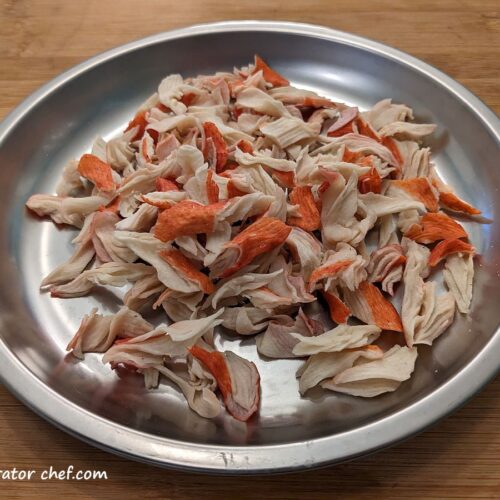
How to Dehydrate Imitation Crab Meat
Equipment
- Removable mesh screen insert (one for each dehydrator tray)
- Common kitchen tools (including cutting boards, chef's knife, strainer, can opener, etc.)
- Canning jars with tight-fitting lids
- Desiccant packets for moisture control (optional)
Ingredients
- imitation crab meat
Instructions
Process the Imitation Crab Meat
- Break down the larger imitation crab meat pieces into smaller and thinner pieces.
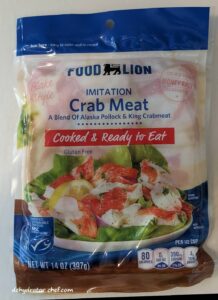
Prepare the Dehydrator
- Layer the crab meat pieces onto the removable mesh screen inserts; one 14-ounce package of imitation crab will fill three Nesco 13.5-inch round dehydrator trays.
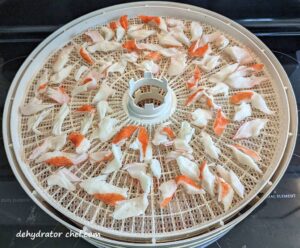
Dehydrate the Imitation Crab Meat
- Set the dehydrator thermostat temperature to 160 °F (71 °C). Dry for 10 to 12 hours until done.
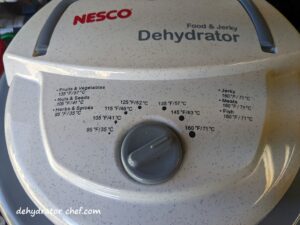
When is the Dehydrated Imitation Crab Meat Done
- When done, the dehydrated crab meat will be crisp and brittle and will snap into smaller pieces when bent. There should be no wet or mushy pieces.
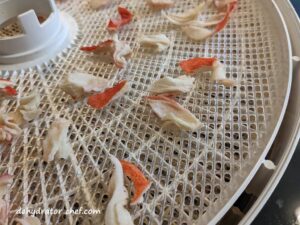
Equalizing and Conditioning Dehydrated Crab Meat
- After a short cooling period, loosely pack the dehydrated crab meat pieces into a clean, dry canning jar with a tight-fitting lid, leaving some headspace.
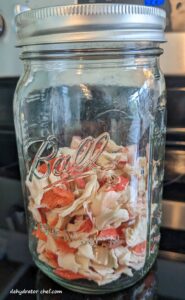
- Every day, for 7 to 10 days, check the jar for moisture. Roll the jar contents around and note any clumping or sticking. If seen, put it all back on the dehydrator for several more hours.
- If you notice any mold at all, even the slightest bit, throw it all out.
Storing the Dehydrated Crab Meat
- Use appropriate-sized canning jars for storage. Depending on how well you dehydrate the crab and your pantry storage conditions, it should keep for at least five months.
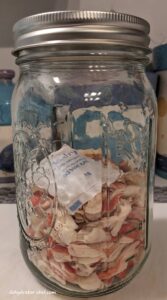
- An optional food-safe desiccant packet will aid with moisture control.
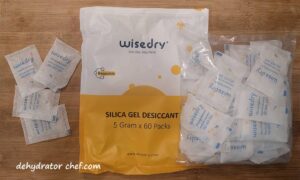
- Attach or include a label describing the jar contents and the date the product was dehydrated. The label identifies the canning jar contents, and the date helps with the rotation schedule. A first-in, first-out rotation helps us to use items that have been on the shelf the longest, so we're using the oldest food first.
Notes
Nutrition
Nutrition information is only an estimate and may differ depending on the ingredients you use.
